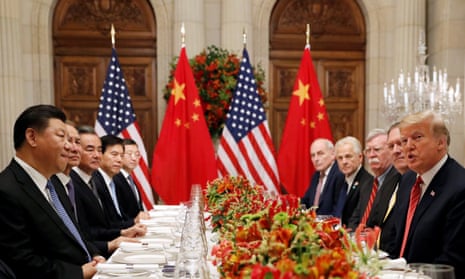Donald Trump has delayed for 90 days his threatened imposition of 25% tariffs on most Chinese imports after a dinner meeting with Xi Jinping, to give time for negotiations on longstanding trade disputes between the two countries, the White House has said.
Trump said their dinner after the G20 summit in Buenos Aires “was an amazing and productive meeting with unlimited possibilities for both the United States and China”.
A statement by the White House spokeswoman, Sarah Sanders, issued as Trump was on his way back to Washington, listed concessions the Chinese president was said have made, including stopping Chinese exports to the US of fentanyl, a synthetic opioid, and the death sentence for convicted traffickers.
Quick GuideLowdown on trade war truce between US and China
Show
What are the terms of the truce between the US and China?
Washington agreed to postpone by 90 days the increase in tariffs from 10% to 25% on $200bn of Chinese goods, due to kick in on 1 January, while China pledged to import more US products, including – according to Washington – farm, energy and industrial products. This should help shrink the US trade deficit with China.
Trump tweeted that China had also agreed to “reduce and remove” tariffs on US car imports from the current 40% level but there was no confirmation from Beijing.
So has the trade war ended?
No. This is seen as a temporary respite in the trade spat between Washington and Beijing, which started in June after talks broke down. For instance, the announcement does not affect a separate $50bn worth of tariffs on Chinese goods – including widescreen TVs and pharmaceuticals – imposed by Trump in June. In September, China retaliated with $60bn of tariffs on US imports, including aircraft and coffee. The US-China truce merely buys both sides more time to negotiate. The White House says there will also be immediate discussions on issues such as intellectual property protection, non-tariff trade barriers (such as customs checks) and cyber theft.
Could this truce fail?
Yes – there was no joint communique and few details have emerged so far. Some analysts say the deal only kicks the can down the road and tensions will resurface in three months.
How much damage has been caused by the trade war so far?
The Chinese economy is cooling and the Shanghai stock market has fallen almost 30% since the start of the year. A survey showed on Monday that new export orders at China’s factories extended their decline in November as the trade war took its toll.
While Trump’s tough stance is popular with his Republican supporters, the US trade deficit with China has worsened. General Motors, the largest US carmaker, announced last week it would halt production at five North American factories and cut 14,700 jobs, a decision partly prompted by the impact of Trump’s tariffs.
Why are the markets reacting so strongly?
The trade truce came as a positive surprise to markets after Trump’s combative comments in the past fortnight. The rally shows how sensitive global markets are to trade tensions. Julia Kollewe
The statement said that Xi, “in a wonderful humanitarian gesture, has agreed to designate fentanyl as a controlled substance, meaning that people selling fentanyl to the United States will be subject to China’s maximum penalty under the law”.
The press statement said Trump would not follow through his threat to raise tariffs on $200 bn worth of Chinese goods from 10% to 25% in the new year, which he had described as a reprisal for a long history of unfair Chinese trade practices. There were widespread concerns that such a large hike in tariffs could trigger a serious trade war between the two countries, with devastating results for the global economy.
According to Sanders, Xi agreed that China would purchase “a not yet agreed upon, but very substantial, amount of agricultural, energy, industrial, and other product from the United States to reduce the trade imbalance between our two countries”.
“China has agreed to start purchasing agricultural product from our farmers immediately,” the statement said. Since trade tensions have escalated under Trump, China has radically reduced its import of US soy beans and other farm products, with direct impact on farmers in the US mid-west where Trump has drawn much of his political support.
Sanders said the two leaders had agreed to begin immediate negotiations on “structural changes” on chronic issues of contention, including the practice of forcing US investors to hand over technological knowhow, intellectual property protection and non-tariff barriers to entry for US businesses. The negotiations would also encompass cyber theft, services and agriculture.
“Both parties agree that they will endeavour to have this transaction completed within the next 90 days. If at the end of this period of time the parties are unable to reach an agreement, the 10% tariffs will be raised to 25%,” Sanders said.
The Chinese government also welcomed the outcome of the talks.
“The two presidents agreed that the two sides can and must get bilateral relations right,” Wang Yi, China’s lead diplomat, told reporters in Buenos Aires. “Discussion on economic and trade issues was very positive and constructive. The two heads of state reached consensus to halt the mutual increase of new tariffs.”
Wang did not give as many details as the White House, but said: “China is willing to increase imports in accordance with the needs of its domestic market and the people’s needs, including marketable products from the United States, to gradually ease the imbalance in two-way trade.”
Technology trade body ITI said the agreement was “a critical step toward de-escalating the mutually damaging trade war between the world’s two largest economies”.
Financial analysts were cautiously optimistic. Paul Ashworth of Capital Economists pointed out that Trump tore up an earlier trade deal with China this year.
“We suspect that since he negotiated this deal himself, Trump will be much more reluctant to torpedo it when his own personal reputation is on the line,” Ashworth added.
